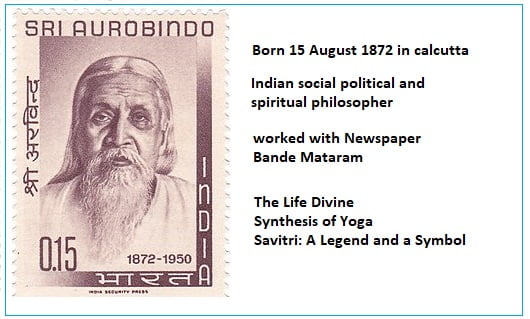Sri Aurobindo Ghose
Context:
Recently, the Prime Minister has set up a 53-member committee to mark the 150th birth anniversary of spiritual leader Sri Aurobindo on 15th August 2022.
About Sri Aurobindo Ghose:
- Sri Aurobindo Ghose born 15 August 1872 in calcutta and died 5 December 1950 in Pondicherry.
- He was an Indian social political and spiritual philosopher, yoga guru, maharishi, poet, revolutionary leader and Indian nationalist ideolouge.
- He was also a journalist, editing newspapers such as Bande Mataram
- He joined the Indian movement for independence from British colonial rule, until 1910 was one of its influential leaders and then became a spiritual reformer, introducing his visions on human progress and spiritual evolution.
- Aurobindo studied for the Indian Civil Service at King’s College, Cambridge, England.
- After returning to India he took up various civil service works under the Maharaja of the Princely state of Baroda and became increasingly involved in nationalist politics in the Indian National Congress and the nascent revolutionary movement in Bengal with the Anushilan Samiti.
- He was arrested in the aftermath of a number of bombings linked to his organization in a public trial where he faced charges of treason for Alipore Conspiracy. However Sri Aurobindo could only be convicted and imprisoned for writing articles against British colonial rule in India. He was released when no evidence could be provided, following the murder of a prosecution witness, Narendranath Goswami, during the trial. During his stay in the jail, he had mystical and spiritual experiences, after which he moved to Pondicherry, leaving politics for spiritual work.
- At Pondicherry, Sri Aurobindo developed a spiritual practice he called Integral Yoga.
- The central theme of his vision was the evolution of human life into a divine life in divine body.
- He believed in a spiritual realisation that not only liberated but transformed human nature, enabling a divine life on earth. In 1926, with the help of his spiritual collaborator, Mirra Alfassa (referred to as “The Mother”), Sri Aurobindo Ashram was founded.
- His main literary works are
- The Life Divine, which deals with the philosophical aspect of Integral Yoga;
- Synthesis of Yoga, which deals with the principles and methods of Integral Yoga; and
- Savitri: A Legend and a Symbol, an epic poem.
Sri Aurobindo had five-part vision namely:
- He wished to see free and independent India that he witnessed on 15 August, 1947 on his birthday.
- Resurgence of Asia
- World Union
- The spiritual gift to India to the world
- A step in evolution which would raise man to a higher and larger consciousness.
Sri Aurobindo: Ashram
In 1926, he established ashram that has witnessed tremendous growth over the years. That time, there were 124 disciples and today more than 1200 members are there.
Important Indian Freedom Fighters and their contributions
| Freedom Fighter | Notable Activities/Events |
| Mohandas Karamchand Gandhi | Father of nation Civil rights activist in South Africa Champaran and Kheda Satyagraha Nonviolence Civil disobedience Quit India movement |
| Dr. B R Ambedkar | Father of Constitution First Law Minister of India |
| Dr. Rajendra Prasad | First President of The Republic of India Leader from Bihar |
| Sardar Vallabhbhai Patel | Actively participated in the Civil Disobedience Movement and Quit India Movement Unified India |
| Jawaharlal Nehru | Preeminent fighter First Prime Minister of India |
| Bhagat Singh | Most influential revolutionary |
| Rani Gaidinliu | Naga spiritual and political leader |
| Pingali Venkayya | Designer of the flag on which our National Flag is based |
| Rani Laxmi Bai | Indian Rebellion of 1857 |
| Veerapandiya Kattabomman | Was an 18th-century Tamil chieftain. He refused to accept the sovereignty of the British East India Company and waged war against them. He was captured by the British and was hanged on 16 October 1799 |
| Mangal Pandey | Indian Rebellion of 1857 |
| Bakht Khan | Indian Rebellion of 1857 |
| Chetram Jatav | Indian Rebellion of 1857 |
| Bahadur Shah Zafar | Indian Rebellion of 1857 |
| Begum Hazrat Mahal | Indian Rebellion of 1857 |
| Asaf Ali | Indian national movement |
| Ashfaqulla Khan | Kakori conspiracy |
| Manmath Nath Gupta | Kakori conspiracy |
| Rajendra Lahiri | Kakori conspiracy |
| Sachindra Bakshi | Kakori conspiracy |
| Ram Prasad Bismil | Kakori conspiracy |
| Roshan Singh | Kakori conspiracy |
| Jogesh Chandra Chatterjee | Kakori conspiracy |
| Annie Besant | Starting the Home Rule Movement |
| Bagha Jatin | The Howrah-Shibpur conspiracy case |
| Kartar Singh Sarabha | Lahore conspiracy |
| Basawon Singh (Sinha) | Lahore conspiracy case |
| Senapati Bapat | Leader of the Mulshi Satyagraha |
| Bhikaji Cama | Unfurled the Indian flag at the International Socialist Conference at Stuttgart in Germany, 1907 |
| Kanaiyalal Maneklal Munshi | Founder of Bharatiya Vidya Bhavan |
| Tirupur Kumaran | Founder of the Desa Bandhu Youth Association |
| Lakshmi Sahgal | Officer of the Indian Army |
| Parbati Giri | Mother Teresa of Western Orissa. |
| Kanneganti Hanumanthu | Palnadu Rebellion |
| Alluri Sitarama Raju | Rampa Rebellion 1922-1924 |
| Sucheta Kriplani | Chief Minister of an Indian state (UP) Founder of the All India Mahila Congress 1940 She sang Vande Mataram in the Constituent Assembly on 15th August 1947 |
| Bhavabhushan Mitra | Ghadar Mutiny |
| Chandra Shekhar Azad | Reorganised the Hindustan Republican Association under its new name of Hindustan Socialist Republican Association (HSRA) after the death of its founder |
| Subhas Chandra Bose | Was twice elected President of the Indian National Congress. The INA revealed Subhash Bose’s greatness as a military leader and an organiser. (He was not the founder of INA). |
| Chittaranjan Das | Leader in Non-cooperation Movement from Bengal and Founder of Swaraj party |
| Prafulla Chaki | The Muzaffarpur killing |
| Khudiram Bose | The Muzaffarpur killing |
| Madan Lal Dhingra | The assassination of Curzon Wyllie |
| Surya Sen | Mastermind of Chittagong Armoury raid |
| Pritilata Waddedar | Pahartali European Club attack |
| Rash Behari Bose | Indian National Army |
| Shyamji Krishna Varma | Founder of the Indian Home Rule Society, India House and The Indian Sociologist in London. |
| Subodh Roy | Tebhaga movement |
| Tanguturi Prakasam | The first chief minister of the new Andhra state, created by the partition of Madras State along linguistic lines. |
| Ubaidullah Sindhi | Silk Letter Conspiracy |
| Vasudev Balwant Phadke | Deccan Rebellion |
| Vinayak Damodar Savarkar | One of the leading figures of Hindu Mahasabha and the formulator of Hindu Nationalist Philosophy |
Source: Indian Express
Also Read




